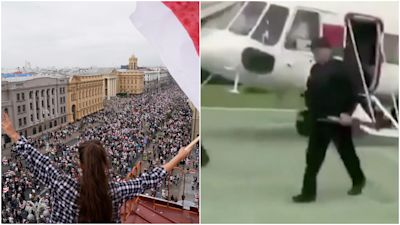Video shows armed Belarus president as protests roil capital

Video report by ITV News Correspondent John Ray
The authoritarian president of Belarus made a dramatic show of defiance on Sunday against the massive protests demanding his resignation, toting a rifle and wearing a bulletproof vest as he strode off a helicopter that landed at his residence while demonstrators massed nearby.
In the 15th day of the largest and most determined protests ever in independent Belarus, a crowd of about 200,000 rallied against President Alexander Lukashenko in a square in Minsk, the capital.
They then marched to another rally and approached the Independence Palace, the president’s working residence, where police in full riot gear stood shoulder-to-shoulder, holding large shields.
Video from the state news agency Belta showed a government helicopter landing on the grounds and Mr Lukashenko getting off holding what appeared to be a Kalashnikov-type automatic rifle.
No ammunition clip was visible in the weapon, suggesting that Mr Lukashenko, who cultivates an aura of machismo, aimed only to make a show of aggression.
Sunday’s demonstration overflowed Minsk’s sprawling seven-hectare (17-acre) Independence Square.
There were no official figures on crowd size, but some estimates suggest around 200,000 may have taken to the streets to call for Mr Lukashenko to resign.
The size and duration of the protests are unprecedented for Belarus, a former Soviet republic of 9.5 million people that Mr Lukashenko has ruled with an iron fist for 26 years.
Dozens of police prisoner transport vehicles were parked on the fringes of the demonstration, but police made no immediate efforts to break up the gathering.
The demonstrators began to disperse in the evening rain.
In a show of support with Belarus, more than 50,000 Lithuanians joined hands in a human chain stretching 20 miles from the capital of Vilinus to the Belarus border to express solidarity with their neighbour’s dramatic struggle for democracy.
The massive event, dubbed “the Freedom Way” resembled another historic event on August 23, 1989, when over a million people in the nations of Estonia, Latvia and Lithuania formed the Baltic Way, a human chain stretching from Vilnius to Tallinn, to demand an end to the Soviet occupation.
“Thirty years ago, Lithuania broke its shackles of oppression, showing the world that we are free and, first of all, free in our spirit. Today, the time has come for our Belarusian brothers to say the dear word ‘freedom,’” Lithuanian President Gitanas Nauseda said.
He was one of many prominent Lithuanians who joined the event, along with former presidents Valdas Adamkus and Dalia Grybauskaite, diplomats and military officers from dozens of countries.
Earlier this month, some 7,000 people were arrested, many of them beaten with clubs or wounded by rubber bullets, in the protests after the August 9 election which officials claim handed President Lukashenko a sixth term in office.
Four people are reported to have died in the protests.
Protesters say the official election results, in which the man known as "Europe's last dictator" reportedly received 80% of the vote, are fraudulent.
'Europe's last dictator': Who is Belarus president Alexander Lukashenko?
'They beat me - I lost count of how many times': Protesters in Belarus tell their story
The 65-year-old leader appears to be flailing about for a strategy to counter them.
He has repeatedly blamed Western interference, claimed the protests were backed by the United States and accuses NATO of building up troop concentrations in Poland and Lithuania on Belarus' western border, which the alliance denies.
He also claimed that Russian President Vladimir Putin was willing to offer security assistance to his government to quell the protests if he asked for it. Mr Lukashenko has consistently repressed any opposition during his time in office and weariness with his hardline rule, as well as dismay over the country's deteriorating economy and his cavalier dismissal of the coronavirus pandemic, appear to have galvanised opponents.
A similarly enormous crowd turned out for a protest a week ago and daily demonstrations have taken place since the vote.
Several of the country's key factories have been hit with protest strikes by workers fed up with government polices.
Those strikes not only threaten the already-ailing economy, but show that opposition to Mr Lukashenko extends beyond educated white-collar circles and into his traditional blue-collar base. “Belarus has changed. Lukashenko has been able to unify everybody, from workers to intelligentsia, in the demand for change,” said protester Slava Chirkov, who attended Sunday's demonstration with his wife and son. They held a sign declaring “Lukashenko, your milk has gone sour,” referencing Mr Lukashenko's former job as the director of a Soviet-era collective farm. Mr Lukashenko's main election challenger, Sviatlana Tsikhanouskaya, fled to Lithuania the day after the election.
Several other possible challengers fled the country even before the election. An opposition Coordination Council was created last week to develop a strategy for a transition of power, but authorities in Belarus have opened a criminal probe into its formation.
As well as protests calling for Mr Lukashenko to resign, rallies have also been held in support of him.